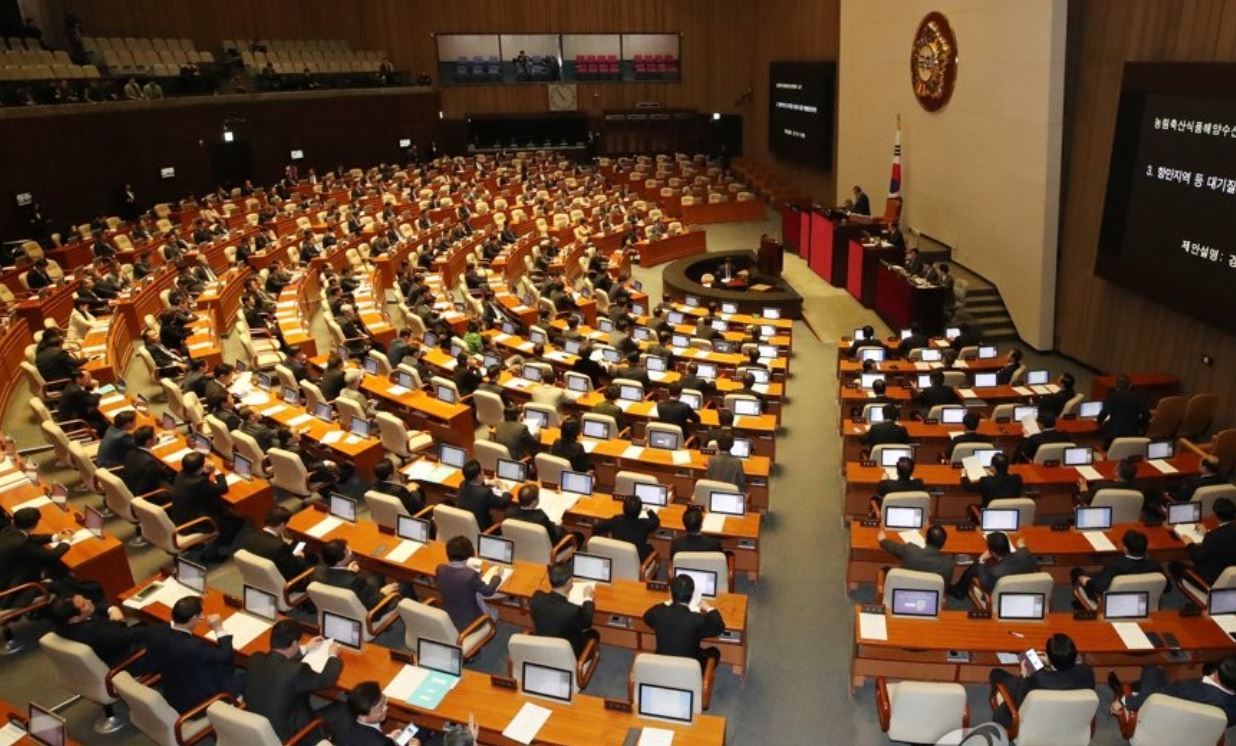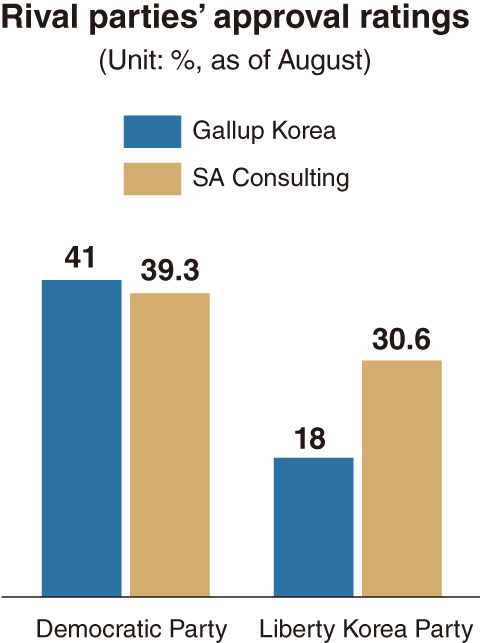[News Focus] Showdown for 21st Assembly to start on threshold of fall
By Kim Yon-sePublished : Aug. 12, 2019 - 18:00
SEJONG -- South Korea’s political parties will de facto enter campaign mode after the Chuseok holiday in the second week of September.
The general election for the 21st National Assembly is coming up in eight months.
Opposition lawmakers have predicted that the general election, slated for April 15, 2020, will pass judgement on the “economic policy failures” of the Moon Jae-in administration.
However, some lawmakers of the ruling Democratic Party of Korea (liberals) argue that the election would mark another stage in completing the task of eliminating deeply rooted corruption and misconduct by past governments.
An interesting point is that the approval rating of the main opposition Liberty Korea Party (conservatives) has yet to catch up with the Democratic Party’s.
The general election for the 21st National Assembly is coming up in eight months.
Opposition lawmakers have predicted that the general election, slated for April 15, 2020, will pass judgement on the “economic policy failures” of the Moon Jae-in administration.
However, some lawmakers of the ruling Democratic Party of Korea (liberals) argue that the election would mark another stage in completing the task of eliminating deeply rooted corruption and misconduct by past governments.
An interesting point is that the approval rating of the main opposition Liberty Korea Party (conservatives) has yet to catch up with the Democratic Party’s.

Though the Liberty Korea Party narrowed the gap in support ratings with the ruling party from 30 percentage points about a year ago to around 20 percentage points early this year, the 20 percentage point gap has continued over the past six months.
According to a poll released Aug. 10 by Gallup Korea, the ruling and main opposition parties posted 41 percent and 18 percent in approval ratings, respectively. The figures were similar to 40 percent and 19 percent, respectively, calculated by the same pollster six months ago, in the second week of February.
Some political analysts point out this could be because the Liberty Korea Party has failed to suggest alternative solutions for lackluster performance in economic policies.
Meanwhile, a survey released Aug. 3 by SA Consulting showed that the gap between the two parties has narrowed to below 10 percentage points -- 39.3 percent for the ruling party and 30.6 percent for the main opposition party.
Furthermore, only 19.2 percent of male respondents in their 20s said they support the Democratic Party, while the corresponding figure for the Liberty Korea Party was 40.1 percent.
The ruling party also trailed behind the opposition in terms of support among men in their 60s or above (26.7 percent vs. 46.4 percent) and women in their 60s or above (24.8 percent vs. 44.4 percent).
The showdown between the rival parties could be affected by possible solidarity with minor opposition parties, according to political analysts.
According to the SA Consulting poll, the Justice Party and the Bareunmirae Party had 7.2 percent and 6.3 percent in approval ratings, respectively.
A crushing defeat for the Democratic Party could turn Moon into a lame duck, as history clearly shows. To avoid that outcome, the ruling party is mapping out strategies to win seats in constituencies nationwide where competition will be especially cutthroat.
“The fiercest showdowns between the rival parties are likely to occur in the Seoul metropolitan area, Chungcheong provinces and Busan-Ulsan-South Gyeongsang Province,” said an analyst.

Collectively, those regions are home to 33.8 million residents and comprise about 65 percent of the country’s population.
Pollster Jowon C&I asked 1,000 people what their priorities would be when they cast ballots in the upcoming parliamentary election. They were asked to choose from a preset list.
The highest percentage of respondents -- 34.8 percent -- viewed the election as a chance to pass judgment on the incumbent government, or impose punishment on it. Next, at 30.2 percent, were those who wanted to support the government in completing its task of abolishing deeply rooted corruption.
About 19 percent of respondents said their priority was to elect legislators who would ensure smooth administrative affairs during the latter part of Moon’s term.
The “anti-Moon” response -- indicating that the incumbent government should be subject to judgment or punishment -- was most frequently seen among residents of Daegu and North Gyeongsang Province at 41 percent.
It occurred next most frequently among respondents from Busan, Ulsan and South Gyeongsang Province at 38.2 percent; those from Seoul at 38.1 percent; and those from Gyeonggi Province and Incheon at 33.9 percent.
By Kim Yon-se (kys@heraldcorp.com)



![[AtoZ into Korean mind] Humor in Korea: Navigating the line between what's funny and not](http://res.heraldm.com/phpwas/restmb_idxmake.php?idx=644&simg=/content/image/2024/04/22/20240422050642_0.jpg&u=)
![[Exclusive] Korean military set to ban iPhones over 'security' concerns](http://res.heraldm.com/phpwas/restmb_idxmake.php?idx=644&simg=/content/image/2024/04/23/20240423050599_0.jpg&u=20240423183955)


![[Graphic News] 77% of young Koreans still financially dependent](http://res.heraldm.com/phpwas/restmb_idxmake.php?idx=644&simg=/content/image/2024/04/22/20240422050762_0.gif&u=)

![[Herald Interview] Why Toss invited hackers to penetrate its system](http://res.heraldm.com/phpwas/restmb_idxmake.php?idx=644&simg=/content/image/2024/04/22/20240422050569_0.jpg&u=20240422150649)





![[Exclusive] Korean military to ban iPhones over security issues](http://res.heraldm.com/phpwas/restmb_idxmake.php?idx=652&simg=/content/image/2024/04/23/20240423050599_0.jpg&u=20240423183955)



![[Today’s K-pop] Ateez confirms US tour details](http://res.heraldm.com/phpwas/restmb_idxmake.php?idx=642&simg=/content/image/2024/04/23/20240423050700_0.jpg&u=)